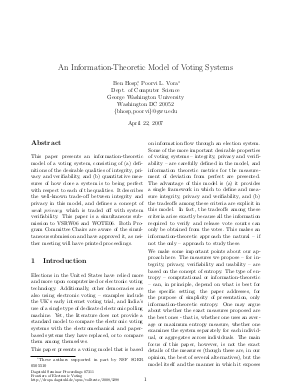An Information-Theoretic Model of Voting Systems
Authors Benjamin Hosp, Poorvi Vora
-
Part of:
Volume:
Dagstuhl Seminar Proceedings, Volume 7311
Part of: Series: Dagstuhl Seminar Proceedings (DagSemProc) - License:
 Creative Commons Attribution 4.0 International license
Creative Commons Attribution 4.0 International license
- Publication Date: 2008-01-15
File

PDF
DagSemProc.07311.4.pdf
- Filesize: 210 kB
- 11 pages
Document Identifiers
Subject Classification
Keywords
- Information-Theory
- Elections
- Measurement
- Integrity
- Privacy
- Verifiability
Metrics
- Access Statistics
-
Total Accesses (updated on a weekly basis)
0PDF Downloads0Metadata Views
Abstract
We present an information-theoretic model of a voting system, consisting of (a) definitions of the desirable qualities of integrity, privacy and verifiability, and (b) quantitative measures of how close a system is to being perfect with respect to each of the qualities. We describe the well-known trade-off between integrity and privacy in this model, and defines a concept of weak privacy, which is traded off with system verifiability. This is an extension of a talk from WOTE 2006, and contains some new applications of the model and arguments for the model's applicability.
Cite As Get BibTex
Benjamin Hosp and Poorvi Vora. An Information-Theoretic Model of Voting Systems. In Frontiers of Electronic Voting. Dagstuhl Seminar Proceedings, Volume 7311, pp. 1-11, Schloss Dagstuhl – Leibniz-Zentrum für Informatik (2008)
https://doi.org/10.4230/DagSemProc.07311.4
BibTex
@InProceedings{hosp_et_al:DagSemProc.07311.4,
author = {Hosp, Benjamin and Vora, Poorvi},
title = {{An Information-Theoretic Model of Voting Systems}},
booktitle = {Frontiers of Electronic Voting},
pages = {1--11},
series = {Dagstuhl Seminar Proceedings (DagSemProc)},
ISSN = {1862-4405},
year = {2008},
volume = {7311},
editor = {David Chaum and Miroslaw Kutylowski and Ronald L. Rivest and Peter Y. A. Ryan},
publisher = {Schloss Dagstuhl -- Leibniz-Zentrum f{\"u}r Informatik},
address = {Dagstuhl, Germany},
URL = {https://drops.dagstuhl.de/entities/document/10.4230/DagSemProc.07311.4},
URN = {urn:nbn:de:0030-drops-12982},
doi = {10.4230/DagSemProc.07311.4},
annote = {Keywords: Information-Theory, Elections, Measurement, Integrity, Privacy, Verifiability}
}
